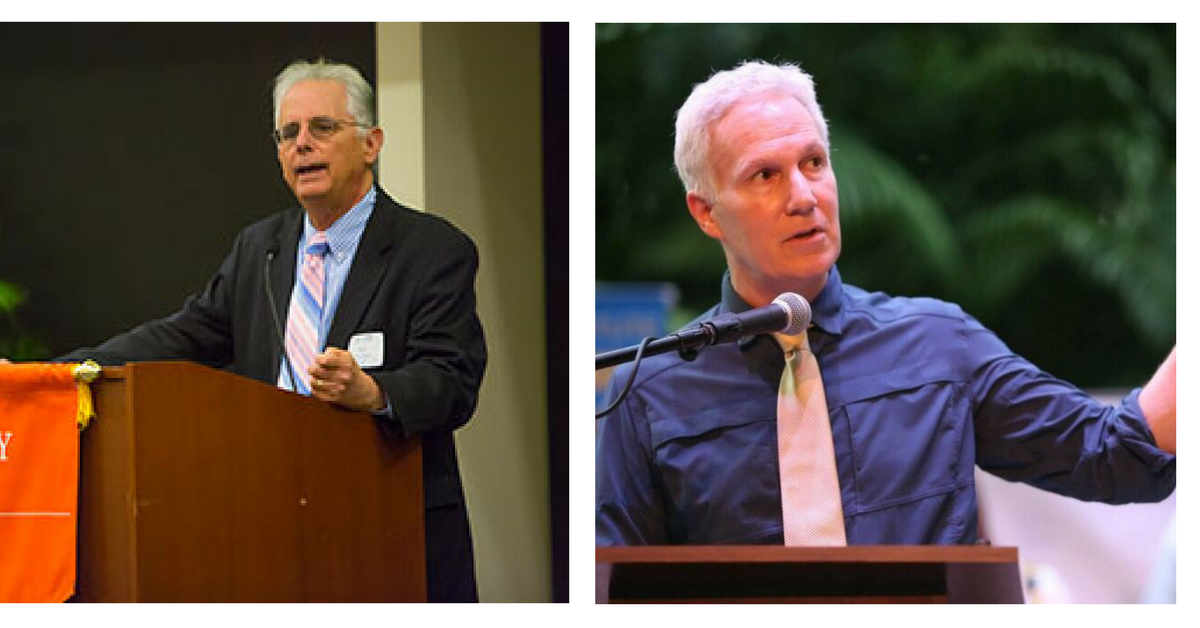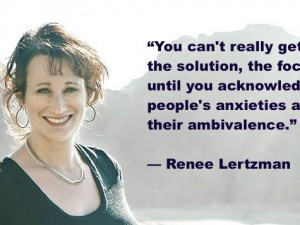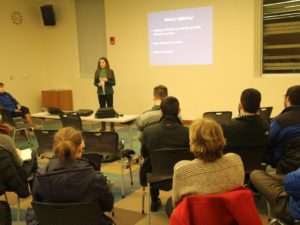
Sam Daley-Harris (L) and Jay Butera (R) joined CCL’s December 2016 call to share three steps to turning your representative into a climate champion.
By Flannery Winchester
Each month, Citizens’ Climate Lobby hosts an international call featuring a guest speaker to educate listeners on topics related to climate change and our Carbon Fee and Dividend proposal.
The guest speakers for December 2016 were Jay Butera, CCL’s Senior Congressional Liaison and Sam Daley-Harris, the founder of RESULTS. They joined our call to walk us through the process of moving members of Congress up the ladder of leadership on climate change.
The champion scale
Sam said he often hears things like, “My member of Congress is so good, I don’t even need to meet with them!” Or the reverse: “My member of Congress is so bad, it’s not even worth meeting with them.” He reminded us that no matter where your member of Congress may stand on the issue of climate change, our job is to meet with them regularly to increase their engagement on this issue.
Here are the 6 levels of the champion scale that you might encounter with your member of Congress:
- Opposed. These MOCs might say things like, “I don’t support that,” or “What you’re talking about isn’t even a problem,” or “I agree it’s a problem, but I don’t like your solution.”
- Neutral. Someone who’s neutral might say “I need more information,” or “Could you give me some materials to read so I can make a more informed decision?”
- Supporter. A supporter might say, “I’ll co-sponsor that,” or “I think that’s a good solution, and I can get behind it.”
- Advocate. An advocate starts to go above and beyond, perhaps saying things like, “Now that I’m a co-sponsor it’s important to build more support, need to educate fellow congressmen etc
- Leader & Spokesperson. This MOC might be the lead sponsor of a bill or an initiator of a caucus, like the Climate Solutions Caucus.
- Champion. This is the final level, and Sam cautions against tossing this label around. “I don’t like it when groups call anyone who does anything good a champion,” he said. “To me, a champion is someone who’s so passionate that they’re out in front of CCL, and pushing CCL to catch up.” For example, if a MOC arranged for five Republican colleagues and five Democratic colleagues to host a town hall meeting on carbon fee and dividend, that would be champion-level effort.
Sam then shared a story from his book “Reclaiming our Democracy,” where CCL’s own Steve Valk and fellow constituents built a relationship with their member of Congress and moved him up the champion scale. In the mid-80s, they successfully moved this MOC from voting against famine aid for starving Ethiopians to co-sponsoring bipartisan legislation on microcredit.
But how did they do it?
3 ways to move people up the champion scale
By examining CCL’s best relationships, Jay identified three rules of thumb to guide you as you engage your representatives and Senators:
1. Frequent and continuous contact with MOC and staffers. Jay said, “It feels like we’re fighting gravity with our relationships—if we are not moving a relationship forward and advancing it, it will be slipping back.” He pointed out that the average congressional staffer handles five or six issue categories, taking eight to 13 meetings per day. That means even if you have one successful meeting, by next month they will have had some 200 other meetings pushing your issue off the front burner, so regular contact is key. This is also important because, Jay said, “Studies show that frequency of contact builds trust. Literally just seeing a person on a regular basis creates a rapport.”
The fruits of this approach appeared in the latest episode of Years of Living Dangerously, where Congressman Lee Zeldin took his first public step on climate change and pledged to join the Climate Solutions Caucus. “That didn’t just happen with a once a year meeting,” Jay pointed out. “Ashley Hunt-Martorano and the great CCL crew in the district there had met with the Congressman 15 times that year—and that doesn’t even include their phone calls, emails, office drop offs and all kinds of other contact.”
Jay reminded us, “You don’t have to go to Washington every month to have this frequent contact. There’s a chapter in Wisconsin that keep a standing monthly meeting in-district with the district staff for their MOC. That’s great. Another chapter has a commitment to attend every town hall meeting the congressman holds.” All those town hall meetings got CCLers on a first-name basis with their representative, just by showing up regularly.
At this point, you might be wondering: How do we have that much contact without them getting tired of us? That brings us to step two.
2. Make yourself useful. Jay said, “Don’t ask what your member of Congress can do for you; let’s ask what we can do for the member.” That means occasionally taking a step back from pushing our concept for a minute and asking what they need—that helps to build good will and solidify the relationship. Jay gave an example of a staffer calling him one day asking for information on another member of Congress, and Jay said, “I put together a 14-page report for them, covering every aspect I knew that could help them approach this member of Congress. That staffer still mentions that to me as being particularly helpful to him and his boss. Help them where they need help, and you’ll be appreciated for it.”
Another way to be helpful is bring new voices to the table, Jay said. He referenced a CCL chapter that put together a letter with 150 small to medium businesses, clergy and elected officials asking their MOC to act on climate change legislation. “That may seem self-serving,” Jay said, “but it goes both ways: if you’re helping to keep the member in touch with their district, it’s of huge importance to them.”
3. Recalibrate, and recalibrate often. “We hit a lot of roadblocks in this work, and there’s no one set of sequences that will keep a relationship advancing forward,” Jay said. So when we hit those roadblocks, his advice is to recalibrate and come up with a new plan or a new angle. Those roadblocks can even be helpful. “All of the best things I have done for CCL have come out of those moments of despair,” Jay said, such as constituent comment forms, which he came up with when sitting in his rental car in Miami after some frustrating conversations. “If you hit a moment of impasse, don’t think of it as a dead end. It just might be a moment of inspiration.”
As you work to carry out those three steps and move your member of Congress up the champion scale, let Jay’s personal mission statement serve as an extra dose of inspiration: “I believe that I can have a major impact on the fate of our planet if I work tirelessly toward climate solutions, think big and act fearlessly. I believe that bold actions by a few brave people can change the course of history and stabilize Earth’s climate. I believe I am one of those people. Doing this will not be easy or comfortable, but it is definitely possible, and since it is possible, I must try. I will not give up.”
For more from Sam and Jay, including their specific advice for engaging your representatives in Congress, listen to their full remarks on our December 2016 podcast. Follow them on Twitter at @samdaleyharris and @jaybutera.





